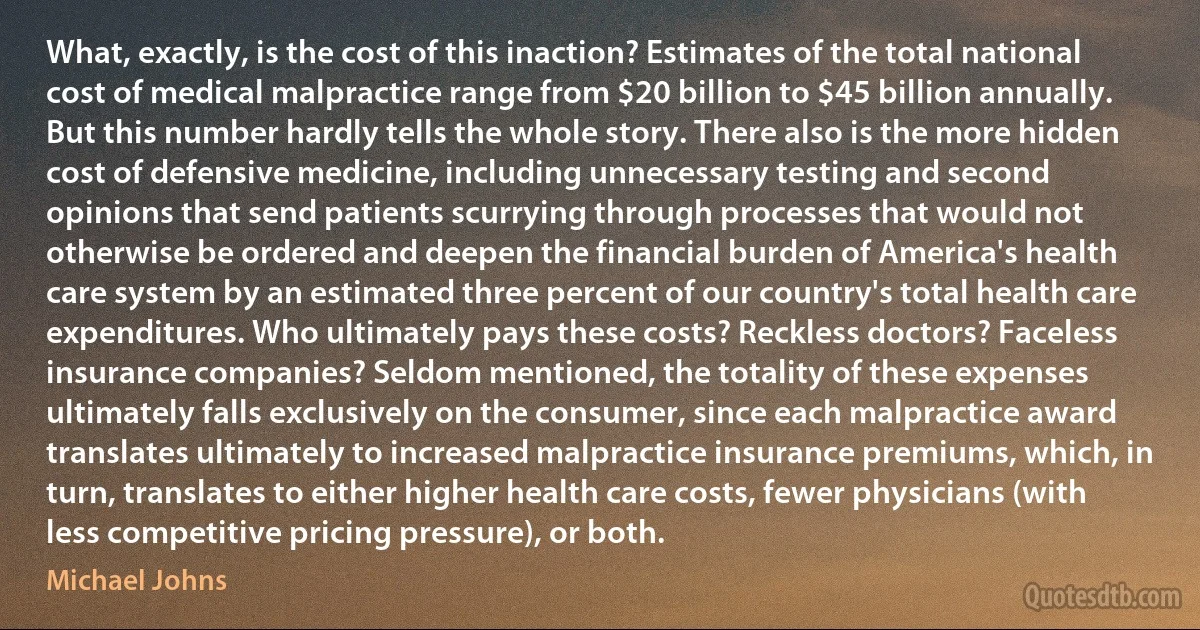
What, exactly, is the cost of this inaction? Estimates of the total national cost of medical malpractice range from $20 billion to $45 billion annually. But this number hardly tells the whole story. There also is the more hidden cost of defensive medicine, including unnecessary testing and second opinions that send patients scurrying through processes that would not otherwise be ordered and deepen the financial burden of America's health care system by an estimated three percent of our country's total health care expenditures. Who ultimately pays these costs? Reckless doctors? Faceless insurance companies? Seldom mentioned, the totality of these expenses ultimately falls exclusively on the consumer, since each malpractice award translates ultimately to increased malpractice insurance premiums, which, in turn, translates to either higher health care costs, fewer physicians (with less competitive pricing pressure), or both.
Michael JohnsRelated topics
award billion burden care consumer cost defensive health hide less medicine national number pricing second send story testing three totality turn falls higher scurrying costsRelated quotes
A remarkable challenge to Milosevic unfolded in the street of Belgrade in December [1996], led by three politicians who banded together in a movement called Zajedno, or the Together Movement. For weeks, hundreds of thousands of Belgrade citizens braved subfreezing weather to call for democracy. But Washington missed a chance to affect events; except for one ineffectual trip to Washington, Zajedno had no contact with senior American government officials, and the Administrations sent no senior officials to Belgrade for fear that their visits would be used by Milosevic to show support. For the first time in eighteen months, Milosevic felt no significant American pressure, and turned back towards the extreme nationalists, including Karadzic, for support. His tactical skills saved him again, and within weeks, the Together Movement was together no more, as its leaders split among themselves.

Richard Holbrooke
The stories of the pharmaceutical companies and the health insurance companies is told. My film acts as a balance. I exist to provide balance, and I tell you, it isn't much balance. They're on every day, all day. My film is two hours. If for two hours during this entire year, people are exposed to the other side of the story, isn't that ok? It's amazing how they go after me. You asked me back there, 'You're biased. You have only one side.' Well, yeah, I have a bias. I have a bias on behalf of the little guy who doesn't have a say. I'm lucky enough to be able to have this bully pulpit, to be able to say the things I say, on behalf of the people who don't have a voice. The pharmaceutical companies and corporate America, they've got their voice. They own the networks and they can say whatever they want, all the time, and they do. So can we just have two hours for this side to have their say? I hope so, I think so. That's what I'm trying to do.

Michael Moore
Vampires can't exist. There'd be detailed records in the archives; they couldn't possibly evade detection by the state for any significant period. Besides which...there'd be corpses everywhere. Human blood is a poor nutrient source; it's about 60 percent plasma by volume and only provides about 900 calories per liter, so your hypothetical blood-sucking fiend is going to have to drink about two and a half liters per day. Those calories don't come in the form of useful stuff like glucose and fat: it's mostly protein from circulating red blood cells. Dracula would have to exsanguinate a victim every day just to stay alive, and would suffer from chronic ketoacidosis. The total number of intentional homicides for the whole country is around 700 a year; a single vampire would cause a 50 percent spike in the murder rate. Or they'd have to take transfusion-sized donations about two thousand times a year.

Charles Stross
Our presence will serve as an incentive for al Qaeda to grow in numbers and motivate more suicide bombers. An indefinite presence, whether in Iraq, Afghanistan, or Pakistan, will continue to drain our financial resources, undermine our national defense, demoralize our military and exacerbate our financial crisis. All this will be welcomed by Osama Bin Laden, just as he planned it. It's actually more than he had hoped for. [...] The war in Afghanistan and Pakistan will be much bigger, unless the dollar follows the path of the dollar-based world financial system and collapses into runaway inflation. In this case, the laws of economics and the realities of history will prove superior to the madness of maintaining a world empire financed by scraps of paper. Our military prowess, backed by a nuclear arsenal, will not suffice in overcoming the tragedy of a currency crisis. Soviet nukes did not preserve its empire or the communist economy.

Ron Paul
... in economic political discussions there is a nearly infinite number of specific questions that may be asked. Besides the ones mentioned in section 3 consider for instance these: "Should we build a road between points A and B in the country?", "Should we promote investments that will give employment to many people, or should we on the contrary promote such investment which will save labour?"... "Should we put more emphasis on things that have up to now not been included in the statistical concept of the gross national product? For instance, should we try to avoid air-pollution and all the kinds of intoxications that may be caused by refuse and waste (a problem that must be studied in its totality as a problem of circulation of matter in society, much in the same way as we study interindustry relations in an input-output table)?", "Should we assess economic value to an undisturbed nature?”.

Ragnar Frisch
